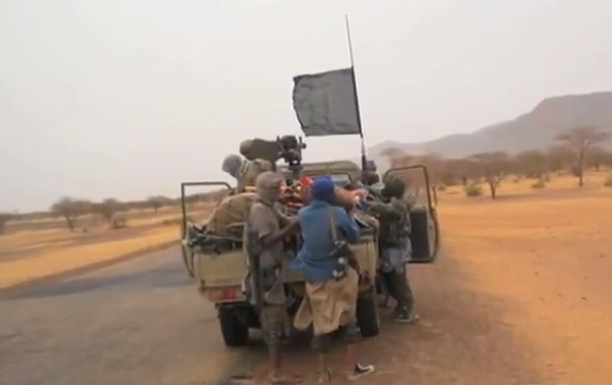
Islamist fighters in northern Mali.
“He reiterated that kinetic measures alone will not end the war and therefore advised that a political solution be implemented.”
On 10 March, the Arabic-language website imangahdien.com, which covers northern Mali, published the excerpted interview with the spokesperson for the Coordination of Azawad Movements (CMA). The CMA includes Tuareg and Arab militant and political movements that seek autonomy for northern Mali. In 2015, the CMA concluded a peace agreement with the Malian government, known as the Algiers Accords. CMA spokesperson Mohamed Ramadan Mouloud suggests that the CMA may take up arms again against the Malian state and renounce the Algiers Accords. The CMA views that a return to war is likely because the current Malian military rulers are unwilling to grant autonomy in parts of northern Mali to the CMA. The CMA’s views regarding the lack of implementation of the Algiers Accords are consistent with the findings of the International Crisis Group, which argued in 2020 that the decentralization and regionalization guaranteed by the Accords had indeed not been fully implemented and that the Malian government focused almost exclusively on the jihadist threat.
Mouloud notes that the CMA welcomed the coup that brought the Malian military to power last year and ousted the democratically elected President Ibrahima Boubacar Keïta. According to Mouloud, Keïta did not implement the Algiers Accords. However, the CMA believes that the military leaders have also not implemented them, despite their promises to do so. Further, the CMA resents the military rulers because they allowed Russian forces, including from the Wagner Group, on Malian soil despite Russia’s record of human rights abuses in Syria, Libya, the Central African Republic, and elsewhere. Moreover, the CMA claims that Russia will not be able to compensate for the withdrawal of French troops from Mali because the security and counter-terrorism demands of the country are too severe for either foreign power to resolve. Rather, the CMA believes its own military forces should be granted increased authority to provide security in northern Mali.
Source:
“المتحدث باسم CMA: العودة إلى الكفاح المسلح ليست مستبعدة في ظل تنصل مالي من اتفاقية السلام (CMA Spokesperson: A return to armed struggle is not excluded because of Mali’s rejection of the peace agreement),” imangahdien.com (Arab language news website), 10 March 2022. https://imangahdien.com/en/2022/03/10/porte-parole-de-la-cma-un-retour-a-la-lutte-armee-nest-pas-exclu-a-la-lumiere-de-la-repudiation-par-le-mali-de-laccord-de-paix/
The spokesperson for the Coordination of Azawad Movements, which signed the peace agreement with the Malian government, stated that a return to armed struggle cannot be discounted because of the Malian government’s disavowal of the agreement concluded between the two parties.
Mohamed Ramadan Mouloud: In fact, we welcomed with anticipation the departure of the regime of former President Ibrahima Boubacar Keïta, who had no will to implement the agreement concluded between the Malian government and the Azawad movements, signed six years ago, all of which was scheduled to be implemented within two years of its signing…. The precedent that has been procrastinating and manipulating the Azawadi issue.
Our position on the Russian presence is very clear and specific. From the first day, we issued a statement rejecting the Russian presence on the territory of Mali, and we said that this presence would represent a danger to the region, and that Wagner’s history is linked to crimes and massacres in Syria, Libya and Central Africa…. Of course, they will not be able to fill the vacuum of the French and European forces, and in fact, the security vacuum in Mali can only be filled by the re-arranged national army, to include the national forces of the Azawad movement.
Source: “Mali’s Algiers Peace Agreement, Five Years On: An Uneasy Calm,” The International Crisis Group (international research organization), 24 June 2020. https://www.crisisgroup.org/africa/sahel/mali/laccord-dalger-cinq-ans-apres-un-calme-precaire-dont-il-ne-faut-pas-se-satisfaire
The agreement seeks to restore peace in Mali principally through a process of decentralisation or regionalisation, reconstituting a national army from the members of the former armed groups that were signatories, and boosting the economy (particularly in the north), based on dialogue, justice and national reconciliation…. So far, the measures have been temporary or too limited to make any real impact on the ground.
Image Information:
Image: Islamist fighters in northern Mali.
Source: Idrissa Fall
https://commons.wikimedia.org/wiki/File:Islamist_fighters_in_northern_Mali.PNG
Attribution: CC x 2.0
